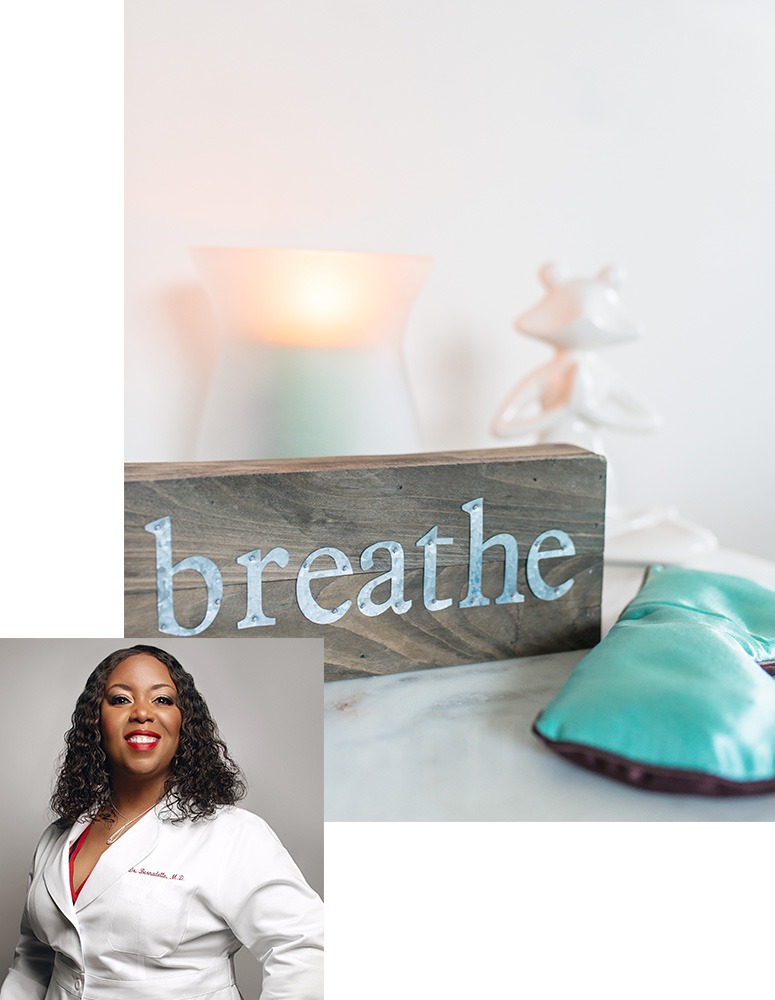Mindfulness Demystified: Living Healthy, Happy and Whole
Bernadette Anderson, M.D., M.P.H., guest contributor
Make a commitment to not sit on the sidelines when it comes to your wellbeing. Refuse to accept that life is mere happenstance, because the truth is that you actively, or perhaps passively, create your own health and wellness. It’s easy to chalk it up to genetics, personal circumstances, or a roll of the dice; however, you play a more important part in your welfare than you probably care to admit. As a matter of fact, being more mindful or aware of how your actions and behaviors influence your vitality may just be the secret to living healthy, happy, and whole.
Mindfulness is increasingly recognized as the missing piece to undeniably better physical and mental health. The payoffs go far beyond the rewards of living in the present moment to boosting the immune system, prevention and self-management of disease, and the presence and clarity to make healthier choices.
The scientific and medical communities now confirm the benefits of conscious attention to the body-mind connection to improve a number of health conditions, including high blood pressure, depression, sleep disorders, obesity and heart disease. “A growing body of research is pointing to an intervention that appears to help prevent relapse of depression by altering thought patterns without side effects: mindfulness-based cognitive therapy, or MBCT.”
But what is mindfulness?
Mindfulness implies intentionality. You deliberately rewire your mindset, reframe your thoughts, and redirect your actions to become the healthiest, happiest version of yourself. At the same time, you fully appreciate that you’re literally and figuratively at the mercy of your own choices. Each time you make a decision to embrace, or not embrace, a healthy habit you understand that you are nurturing your best health or contributing to illness.
Meditation, a popular mindfulness practice, is also recognized for its potential medicinal benefits. For example, it may decrease the risk of heart disease, according to a first-ever statement on the practice issued by the American Heart Association.
I’ve observed firsthand the healing powers of mindfulness. Patients who face the challenges of living with long-standing health problems, but who are open to expanding their treatment outside of medications, are empowered to be proactive in the moment-to-moment managing of their health. For instance, those who regularly include yoga, aromatherapy, or journaling in their routine find it less of a struggle to keep their body, mind, and life in top shape. Some of my patients have successfully used mindful eating, sleep, and stress management strategies to help them control their blood sugar, decrease pain, lower blood pressure, and calm anxiety. A dose of mindfulness may be the therapy you’ve been looking for all along.
Recently, I had a personal brush with the real difference mindfulness makes in recovering from a trauma. My elderly mother fell and fractured her hip—an injury which often spirals into a rapid decline in health. Although surgery repaired the break, it wasn’t a fix for the real damage, which included bruised confidence, shattered hope, and loss of independence. Fortunately, these were no match for mindfulness. My mother’s awareness of the present moment, acceptance of new limitations, regulation of negative emotions and enhanced emphasis on spirituality reduced the stress and fear that might normally impair healing. Positive affirmations motivated her to go from simply standing, to taking a step, to actually walking again. She also used prayer to help her forgive herself for not organizing a safer environment to prevent the mishap. For my mother, mindfulness has facilitated recovery and restored the resilience to move on from her fall.
Using the power of your breath, experiencing stillness, yoga, an unplugged walk in nature, or art therapy—in short, being mindful—can transform every aspect of your life. All that’s required is a natural pause to be present, alive, undistracted, self-aware and engaged. As it turns out, mindfulness goes hand-in-hand with wellbeing.
Dr. Bernadette Anderson is a family physician, the founder of Life in Harmony LLC, and a wellness curator based in Columbus, Ohio. Follow her on YouTube, Instagram, or visit her website: Dr.BernadetteMD.com.
Breathe photo by Theory Image.
